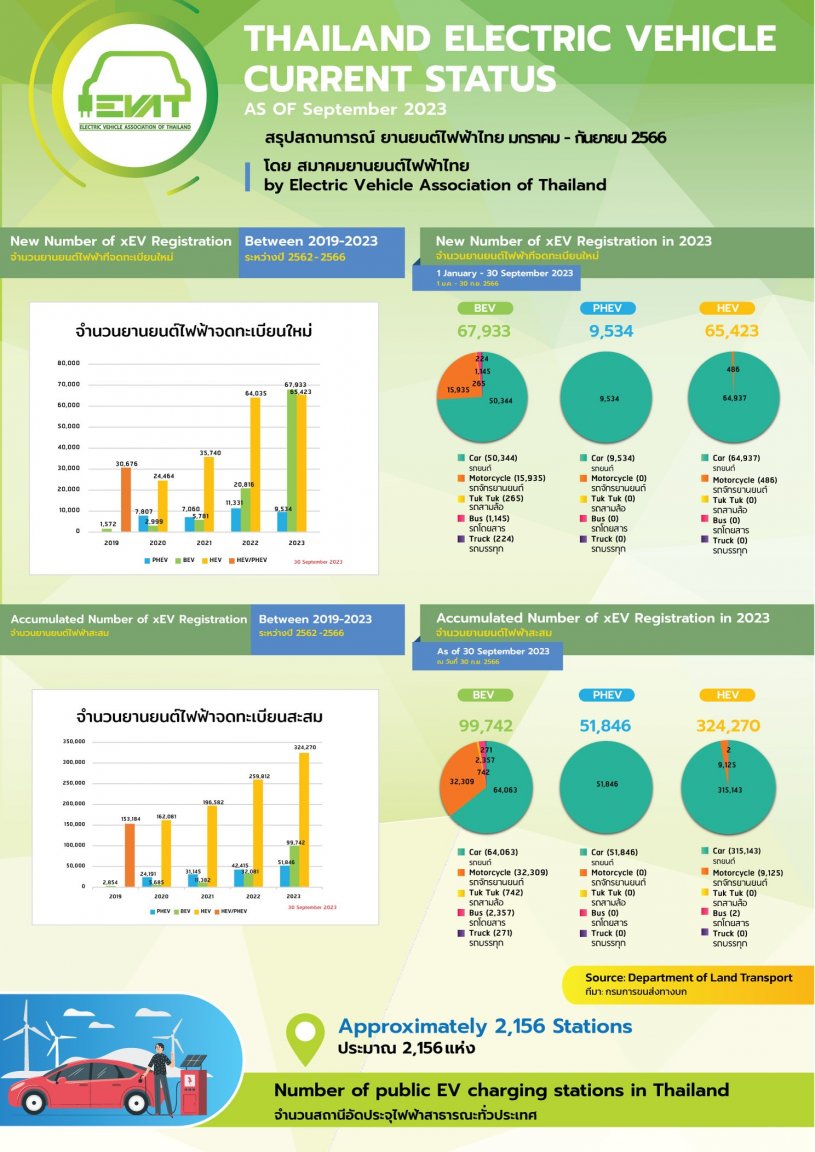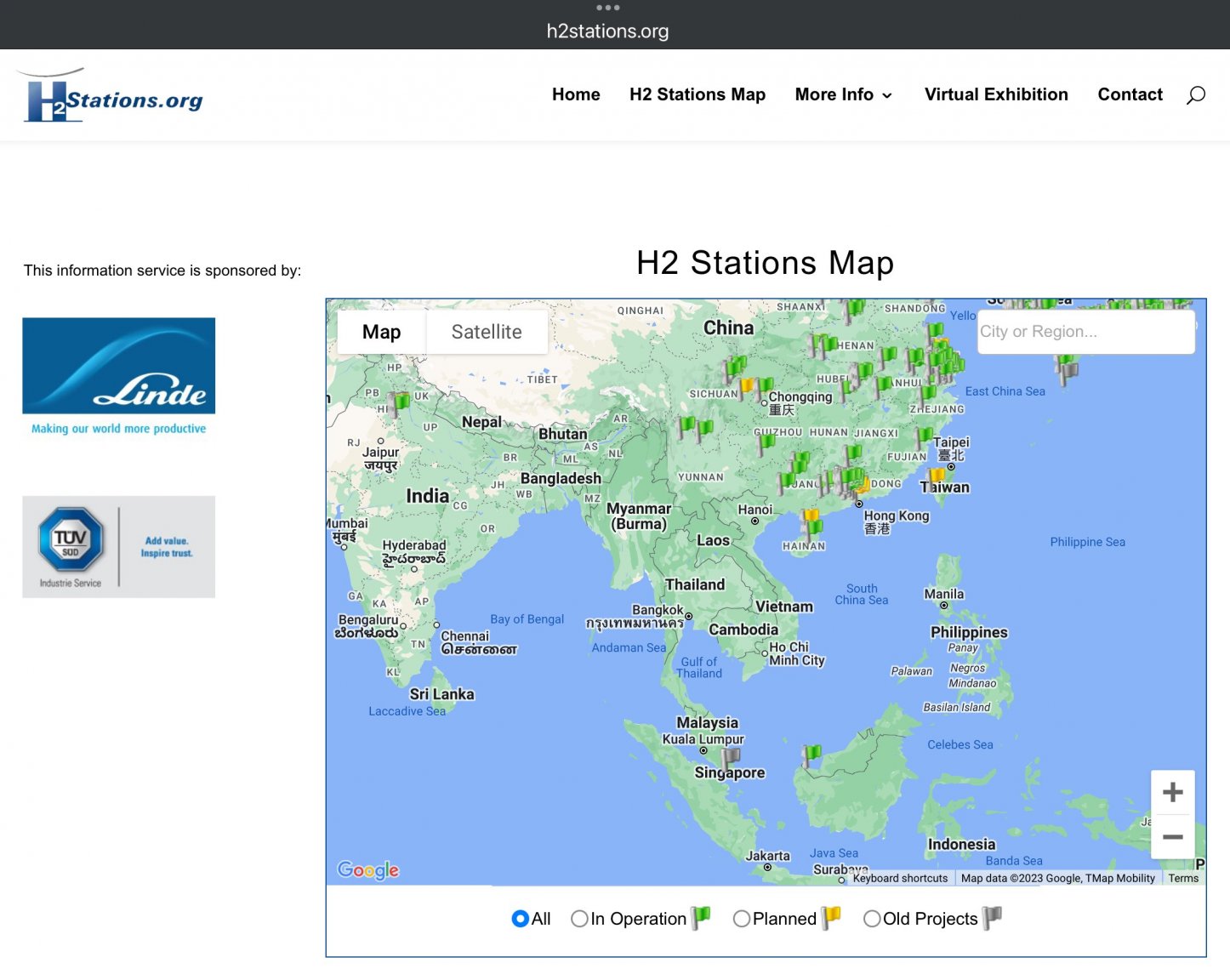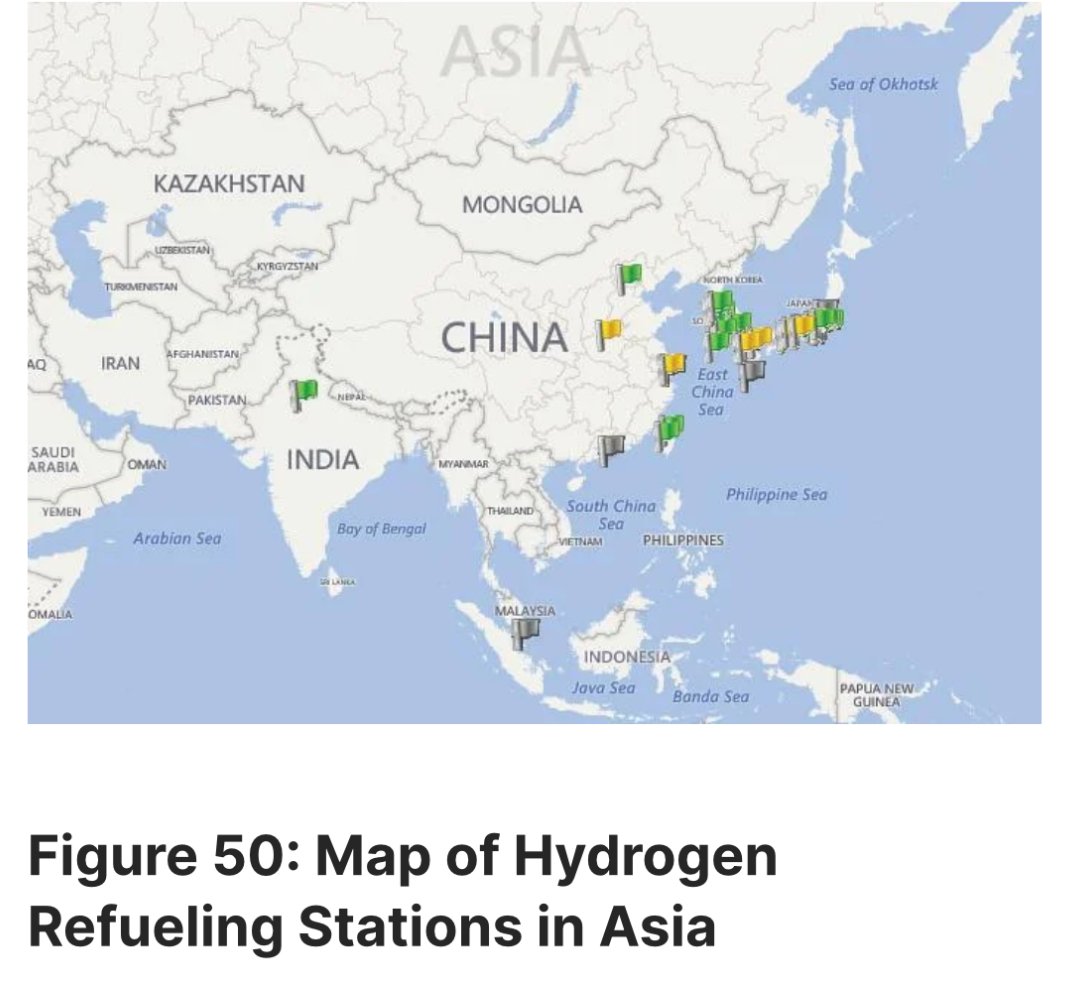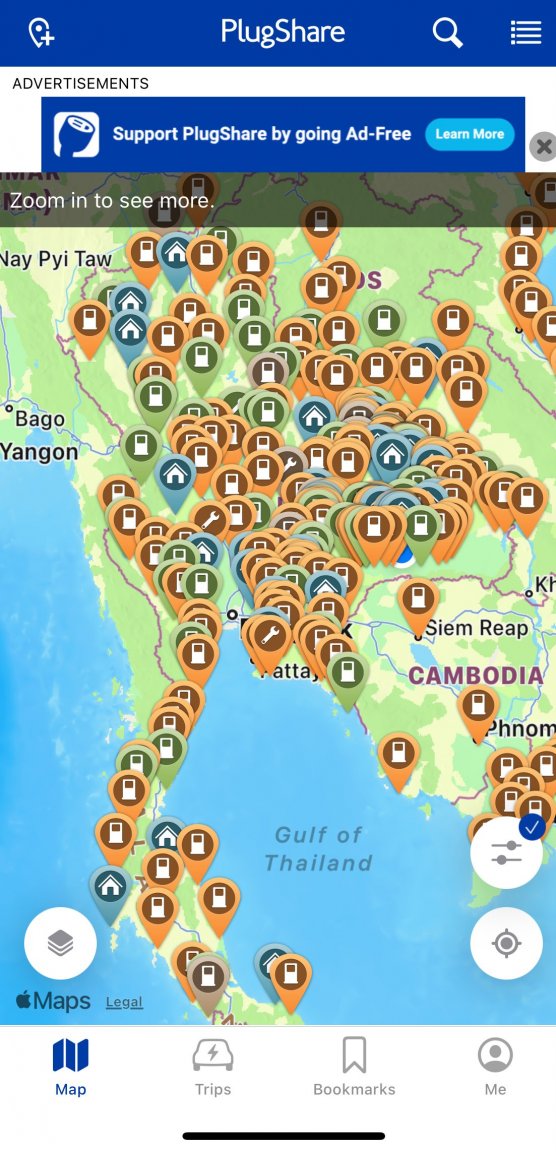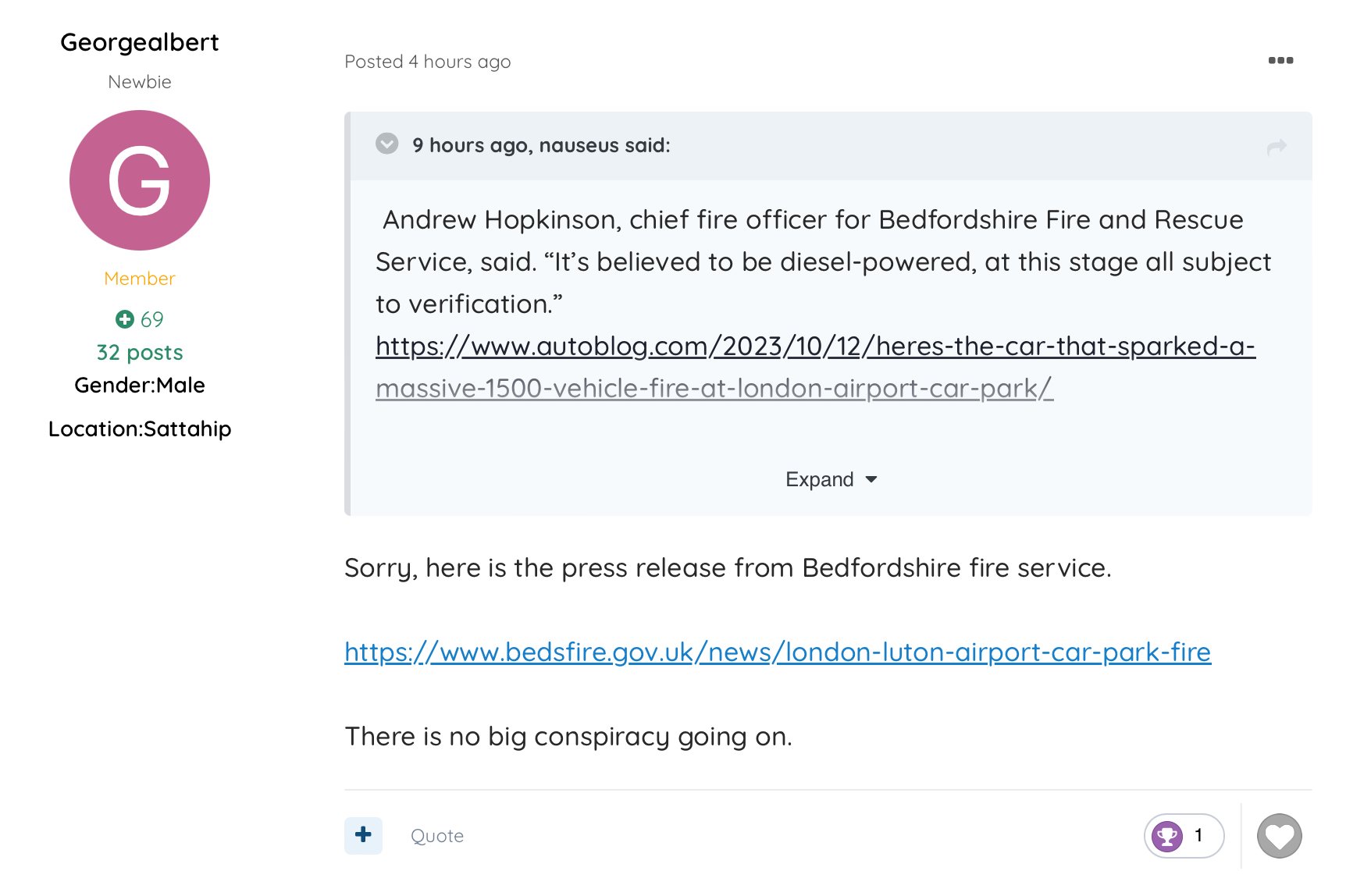-
Posts
2,449 -
Joined
-
Last visited
Content Type
Events
Forums
Downloads
Quizzes
Gallery
Blogs
Everything posted by Bandersnatch
-
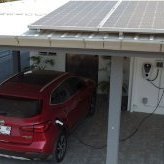
Thailand needs to calm down it's rush to EV !
Bandersnatch replied to TorquayFan's topic in Thailand Motor Discussion
???????????? Thanks, I really enjoyed that - please keep them coming -

Electric Vehicles in Thailand
Bandersnatch replied to Bandersnatch's topic in Thailand Motor Discussion
Buyers Remorse. EVs are like any new technology, they change at a rapid pace. 20 years ago I was working in BKK and dating a girl who worked at Toshiba. She was able to get me staff discount on a new 42 inch TV. 2 years ago I bought an 86 inch TV and it's already out of date. ICE vehicles on the other hand are a mature technology and any improvement year to year are tiny. I also don't think that anybody is considering investing in developing a completely new ICE engine which could be obsolete before it's ready for production. In 2018 at the BKK motor show a ฿2,000,000 40 kWh Li-ion Nissan Leaf with CHAdeMO charging was the only EV I saw. I am glad I waited, but how long do you wait? I have chosen to buy an 82.5 kWh LFP EV with V2L for ฿1,449,000. Will something better come along in the next couple of year? Definitely, but I am happy with the deal I have got and I will enjoy the car instead of fretting over my decision. Life is too short for all that worry. -

Thailand needs to calm down it's rush to EV !
Bandersnatch replied to TorquayFan's topic in Thailand Motor Discussion
The ToryGraph the number one source of balanced information about EVs and Green Energy -

Thailand needs to calm down it's rush to EV !
Bandersnatch replied to TorquayFan's topic in Thailand Motor Discussion
If you think the cause is inconclusive why did you post about the fire into an EV discussion? -

Thailand needs to calm down it's rush to EV !
Bandersnatch replied to TorquayFan's topic in Thailand Motor Discussion
ultracrepidarian and bad-mannered congratulations -

Thailand needs to calm down it's rush to EV !
Bandersnatch replied to TorquayFan's topic in Thailand Motor Discussion
Did you mean Battery Electric Vehicles? H2 is a deception promoted by the fossil fuel industry and I can’t believe people are still falling for it. “First Shell, now Motive, hydrogen fuel station closures continue in the UK The number of hydrogen refuelling stations in the UK has dwindled from 15 in 2021 to just 5 now” https://innovationorigins.com/en/first-shell-now-motive-hydrogen-fuel-station-closures-continue-in-the-uk/#:~:text=This comes on the heels,2021 to just five remaining. Thailand has zero public H2 stations and zero hydrogen cars for sale here. -

Thailand needs to calm down it's rush to EV !
Bandersnatch replied to TorquayFan's topic in Thailand Motor Discussion
@TorquayFan not sure why you are posting a link to a fire started by a diesel car Bedfordshire Fire and Rescue press release. https://www.bedsfire.gov.uk/news/london-luton-airport-car-park-fire -

Thailand needs to calm down it's rush to EV !
Bandersnatch replied to TorquayFan's topic in Thailand Motor Discussion
Because it’s not public - it is a TEST facility -

Thailand needs to calm down it's rush to EV !
Bandersnatch replied to TorquayFan's topic in Thailand Motor Discussion
H2 is being pushed hard by the fossil fuel industry and their lobbyists. As at the end of 2021 47% was made from natural gas, 27% from Coal, 22% from oil and only 4% from electrolysis because it so expensive. https://www.irena.org/Energy-Transition/Technology/Hydrogen#:~:text=As at the end of,around 4% comes from electrolysis. So basically H2 is a fossil fuel. H2 is also being pushed by Japanese Legacy automakers who are late to the EV party and are trying to muddy the debate around Green Energy. Even using Grey and Brown H2 it is still not economic for passenger vehicles. If it was, it would have happened by now. -

Thailand needs to calm down it's rush to EV !
Bandersnatch replied to TorquayFan's topic in Thailand Motor Discussion
Don’t worry, it’s just a test. -

Thailand needs to calm down it's rush to EV !
Bandersnatch replied to TorquayFan's topic in Thailand Motor Discussion
Don’t worry the map hasn’t changed much since 2015. The link to the live map wouldn’t load on my phone but here it is now https://www.h2stations.org/stations-map/?lat=24.310177&lng=120.756532&zoom=4 And a screen shot -

Thailand needs to calm down it's rush to EV !
Bandersnatch replied to TorquayFan's topic in Thailand Motor Discussion
Yes you can but not sure why you would want to as solar increases the value of the house: 2 identical houses one with a ฿5,000 a month electricity bill the other with ฿500 which would you buy? I have already answered this in my reply to the OP please see above. Federal funding isn’t going to help us here in Thailand. I don’t see any investment here in H2 for passenger vehicles. -

Thailand needs to calm down it's rush to EV !
Bandersnatch replied to TorquayFan's topic in Thailand Motor Discussion
This is a discussion about EVs. I’ve just bought my second and you don’t own any and yet you think I’m ignorant about EVS. Stick to subjects that you actually know something about. -

Thailand needs to calm down it's rush to EV !
Bandersnatch replied to TorquayFan's topic in Thailand Motor Discussion
Were you drunk when you wrote this? -

Thailand needs to calm down it's rush to EV !
Bandersnatch replied to TorquayFan's topic in Thailand Motor Discussion
No -

Thailand needs to calm down it's rush to EV !
Bandersnatch replied to TorquayFan's topic in Thailand Motor Discussion
Next time you’re driving by your local BYD dealer, take the BYD Seal for a test drive. It has very impressive handling and is shod in 19inch 235/45-profile Continental SportContact rubber. The 3.8sec 0-100kph AWD version has semi adaptive suspension and Intelligent Torque Adaption Control. -

Thailand needs to calm down it's rush to EV !
Bandersnatch replied to TorquayFan's topic in Thailand Motor Discussion
H2 is just not economic to produce in a sustainable way. When I make power from my solar system to put in my electric car there is some small efficiency loss due to the inversion process, but over 90% of the energy ends up in my car. With current electrolyzers, green hydrogen's efficiency is around 30%, which means 70% of the renewable energy put into producing green hydrogen is lost across the full cycle of production and use. Good luck with Hydrogen in Thailand. Where are you going to buy your Hydrogen car - none for sale here. Toyota keeps making promises about it's Mirai but you can't buy it here. Then where will you fill it up? Thailand has no public H2 filling stations. -

Thailand needs to calm down it's rush to EV !
Bandersnatch replied to TorquayFan's topic in Thailand Motor Discussion
You couldn’t be more wrong. My new EV has a structural battery pack which great torsional rigidity. The weight is set down low under the car with perfect weight distribution. -

Thailand needs to calm down it's rush to EV !
Bandersnatch replied to TorquayFan's topic in Thailand Motor Discussion
The problem here should be obvious in this discussion. The OP doesn’t own an EV and clearly from the amount of fact checking I had to do on his post, knows very little about them. Yet he feels the need to spread the gospel of “Anti-EV” I frankly think it’s pretty sad -

Thailand needs to calm down it's rush to EV !
Bandersnatch replied to TorquayFan's topic in Thailand Motor Discussion
Not economic. When I make power from my solar system to put in my electric car there is some small efficiency loss due to the inversion process, but over 90% of the energy ends up in my car. With current electrolyzers, green hydrogen's efficiency is around 30%, which means 70% of the renewable energy put into producing green hydrogen is lost across the full cycle of production and use. Good luck with Hydrogen in Thailand. Where are you going to buy your Hydrogen car - none for sale here. Toyota keeps making promises about it's Mirai but you can't buy it here. Then where will you fill it up? Thailand has no public H2 filling stations. I make power for my electric car from my home solar system - try making H2 at home. Hydrogen is the fuel of the future and always will be -

Thailand needs to calm down it's rush to EV !
Bandersnatch replied to TorquayFan's topic in Thailand Motor Discussion
In this discussion I have seen 3 people who have both solar and an EV, there maybe be more. I already said I have not seen a Thai study so can’t give you an exact % Most people get solar to power their house first, but in my graph above it should quite clear that the excess solar is “free power” and in my case it is curtailed. -

Thailand needs to calm down it's rush to EV !
Bandersnatch replied to TorquayFan's topic in Thailand Motor Discussion
Based on comments in the EVs in Thailand discussion, many start with solar then get an EV. I am also a member of number of Thai EV groups and hear similar comments. I am not aware of any studies on the subject here in Thailand, but once people get solar and realise the massive surplus of energy that is generated in the middle of the day it really is a only common sense to consider an EV you can drive for free. Here is a graph of power generation from one of my inverters. -

Thailand needs to calm down it's rush to EV !
Bandersnatch replied to TorquayFan's topic in Thailand Motor Discussion
A guy who doesn’t own an EV telling those of us who do that there are no EV chargers in Thailand. If you look closely at the map you will even see my house listed as a charging station. -

Thailand needs to calm down it's rush to EV !
Bandersnatch replied to TorquayFan's topic in Thailand Motor Discussion
If you actually knew anything about EVs you would know that battery chemistry is changing. The 2 biggest EV manufactures are BYD - 100% lithium iron phosphate batteries (LFP) - and Tesla whose best selling models by far are the standard range model 3 & Y that now mostly use lithium iron phosphate (LFP). Ford has also moved to LFP. LFP are far safer than Li Ion My home batteries and new EV have LFP -

Thailand needs to calm down it's rush to EV !
Bandersnatch replied to TorquayFan's topic in Thailand Motor Discussion
No evidence for that (again) Thanks to @Georgealbert for the link https://www.bedsfire.gov.uk/news/london-luton-airport-car-park-fire Thanks





